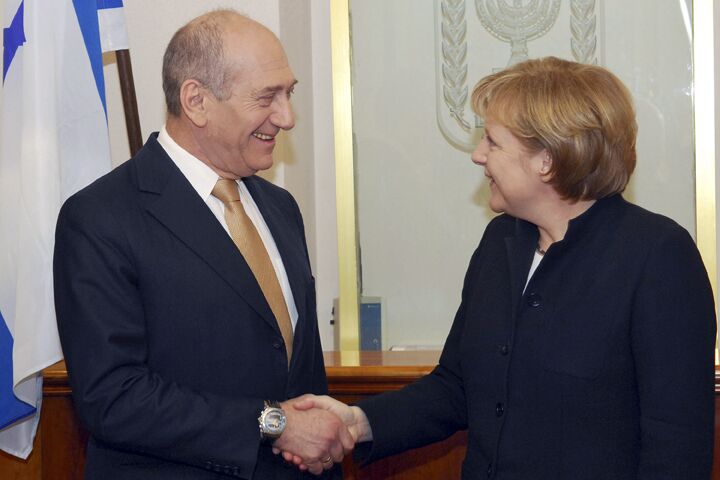
Berlin and Jerusalem: A Treacherous Alliance
Sixty-three years after the liberation of Auschwitz, the German cabinet is meeting in Jerusalem.
On Monday, half the German cabinet—Foreign Minister Frank-Walter Steinmeier included—met with their Israeli counterparts for the first-ever German-Israeli cabinet session. In addition to signing a bilateral agreement for tighter military, cultural, political and economic cooperation between Germany and Israel, the 17 ministers in attendance agreed to continue such joint cabinet sessions on an annual basis.
Annual joint cabinet sessions are a privilege that Germany has previously reserved for only its closest European allies.
Now, Germany is extending this privilege to Israel. Israel is returning the favor by giving Germany special treatment.
Israeli Prime Minister Ehud Olmert personally met German Chancellor Angela Merkel as she arrived at Ben Gurion Airport on Sunday—an honor that Olmert has up until now only bestowed on U.S. President George W. Bush. Merkel was then accompanied to the grave of David Ben Gurion, the father of modern Israel, by Israeli President Shimon Peres before she visited the Holocaust memorial with Olmert.
“The chancellor’s visit has the same status as a visit by the U.S. president,” said Olmert’s chief of staff.
Germany is being hailed as Israel’s strongest European ally, with Merkel being given the unprecedented honor of being the first foreign head of government to speak before the Knesset—an honor traditionally reserved only for foreign heads of state. In her speech, Merkel declared that Iran has no right to nuclear weapons, that Israel must remain a sovereign and free state, and that Israeli-Palestinian peace must be fostered with a two-state solution. The German chancellor won a standing ovation as she proclaimed that Germany would always stand by Israel.
The friendly rhetoric flying back and forth between Berlin and Jerusalem seems to have all the hallmarks of a special and blossoming alliance. But is Germany really a friend of Israel?
Merkel may have declared Germany’s “everlasting responsibility” to the Jewish state, but the fact remains that Germany is one of the largest financial supporters of the Palestinian cause. At an international conference on the Palestinian economy that was held in Paris last December, Germany promised to donate $200 million to the Palestinian Authority by the end of 2010. The German-dominated European Union promised the even greater sum of $650 million by the end of this year.
Just days before her visit to Israel, Merkel reiterated her commitment to never letting go of efforts to push for Israeli peace through a two-state solution with the Palestinians. A major conference to support the establishment of an independent Palestinian state will be held in Berlin this summer.
Germany’s good relations with both the Israelis and the Palestinians make Germany appear the ideal arbitrator between the two peoples. As President Bush’s efforts to foster Israeli-Palestinian peace continue to fail, Israel is looking increasingly to Germany to fill the void.
Sixty-three years after the liberation of Auschwitz, Germany has become one of the major players in the Middle East peace process. Yet, both history and Bible prophecy reveal that Israel’s reliance on Germany, rather than on God, will only result in one of the greatest acts of treachery in history. For more information on this double-cross, read Nahum—An End-Time Prophecy for Germany.
